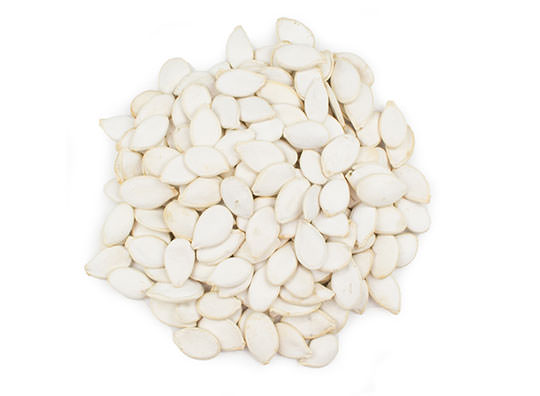Pumpkin Seeds in Shell
Pumpkin seeds are the edible seeds of a pumpkin or certain other cultivars of squash.
Pumpkin seeds are a good source of healthful oils, magnesium, and other nutrients that enhance the health of the heart, bones, and other functions.
Pumpkin Seeds are considered to be a great source of potassium, magnesium, and calcium.
Please contact our office regarding size availability and details.
The products are roasted locally based on client requirements to maintain freshness and ensure the quality of the final product. The varieties of roasting currently available includes:
- Dry Roast
- Salted (Roasted and Salted)
- Snow White
- BBQ
- Black Pepper

HEALTH BENEFIT
The fatty acids in pumpkin seeds contains a range of beneficial nutrients, such as sterols, squalene, and tocopherols. Researchers have described the fatty acid profile of seeds, grains, and legumes as “favorable.”
Pumpkin seeds are also a good source of minerals such as:
- potassium
- calcium
- iron
- copper
- manganese
Pumpkin seeds contain omega-3 and omega-6 fatty acids, antioxidants, and fiber. This combination has benefits for both the heart and liver.
The fiber in pumpkin seeds helps lower the total amount of cholesterol in the blood and decrease the risk of heart disease.
SELECTION & STORAGE
Seeds have a high-fat content, so they are prone to rancidity. Keep pumpkin seeds in a cool, dark, and dry place to improve shelf life.
If stored properly, pumpkin seeds will keep for 3-4 months.
PREPARATION & SERVING METHOD
Pumpkin seeds can be eaten alone as a snack or added to dishes for extra taste and a crunchy texture.
They can be mixed and roasted with other nuts and dried fruits to create a delicious mix.
The Pumpkin seed kernels can be made into butter by blending raw pumpkin seeds in a food processor until smooth.
The Pumpkin seed kernels is also used as a filling for pastries or topping for baked goods and various food dishes.
SAFETY PROFILE
Most people eat pumpkin seeds in moderation without experiencing negative side effects. You can eat raw or roasted pumpkin seeds and shells. You can also eat hulled pumpkin seeds. Both are available at natural food stores and many grocery stores.
Pumpkin seed shells are chewy. Their edges may also become sharp during chewing. If you have any difficulty chewing food or swallowing, you may want to stick to eating hulled varieties.
Pumpkin seeds are high in fiber, so eating large amounts may cause gas or bloating.
Eating large amounts of pumpkin seeds at once may cause constipation.


